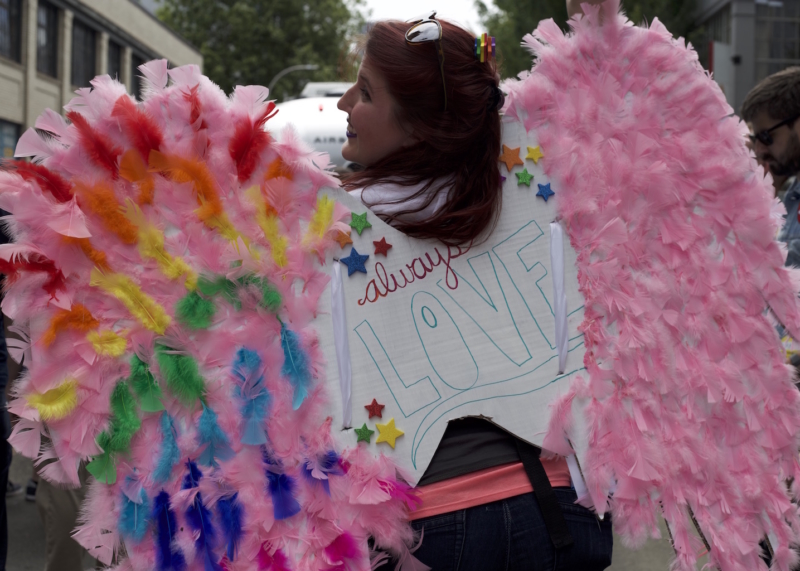Before coming out, media planner Megan Barta was apprehensive about how her coworkers would react to her sexual orientation. When talking about her weekend plans she always hedged a bit, saying “friend” rather than “girlfriend.”
“My biggest fear, behind telling my family, was experiencing negative repercussions at work because of my orientation,” says Barta. “I started to realize that if people were talking about their partners, there was no reason I shouldn’t be able to do the same just because I was gay.”
With the support of her coworkers at an “incredibly supportive and inclusive” advertising agency called Mintz+Holt, Barta wrapped a rainbow flag around her shoulders and joined the Portland Pride Parade.

Also cheering her on were other members at Portland’s WeWork Custom House. They formed a colorful contingent for the annual event that makes its way through downtown.
“To have the community at my WeWork office share the same values is a pretty incredible feeling,” says Barta.
Besides Portland, WeWork is participating in at least half a dozen other major events during Pride Month. Over the past three weeks there have been events in Boston, Los Angeles, and Washington, D.C. This weekend there will be others in Chicago and Seattle.

“Seeing WeWork come together for Pride events around the country reinforces that it is focused on creating a better community and not just a company that leases space for others to work their 9-to-5s,” says Collin Matthews, founder of the Boston-based Press Foundry. “This is one of the reasons WeWork resonates so much with us.”
The grand finale this Sunday is in New York City, where WeWork will have its own float making its way down 5th Avenue. More than 500 members and employees have said they’ll turn out for the event.
Alex Johnson, who smiled for the cameras wearing one of WeWork’s “Always Love” T-shirts, says he was “honored to march alongside of many of the same people who I work next to during the week.”

He said sponsoring the event was another reminder that WeWork is more than just a place to work.
“Providing a safe space for people to celebrate the differences within the community goes a long way in establishing a greater connection,” says Johnson. “It feels much more like a family.”
For many members, the event was even more personal. For Nikki Gordon-Bloomfield, who identifies as transgender, lesbian, and an immigrant, says it made her feel like a part of the community.
“In a new scary age where knee-jerk reactions seek to marginalize people based on their sexuality, assigned at birth gender, religious beliefs, or where they were born, being able to march in Pride with my friends and my neighbors at WeWork made me feel loved and supported for who I am,” she says.







